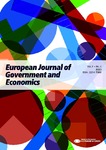Voting turnout in Greece: expressive or instrumental?

Ver/Abrir
Use este enlace para citar
http://hdl.handle.net/2183/25714
Excepto si se señala otra cosa, la licencia del ítem se describe como Atribución-NoComercial 4.0 España
Colecciones
Metadatos
Mostrar el registro completo del ítemTítulo
Voting turnout in Greece: expressive or instrumental?Autor(es)
Fecha
2020Cita bibliográfica
Daskalopoulou, I. (2020). Voting turnout in Greece: expressive or instrumental?. European Journal of Government and Economics, 9(1), 26-45. https://doi.org/10.17979/ejge.2020.9.1.5426
Resumen
[Abstract The study analyses the micro-level determinants of voting turnout rates in Greece. In particular, we test for the effects of citizens’ socio-economic features, political participation, activism and trust as pointing to either an expressive or instrumental voting decision process. The analysis involves bootstrap logistic regression techniques and ESS data covering the 2002-2011 period. Evidence is found of instrumental voting in Greece as suggested by the effects of absolute and relative income and the effect of civic participation and trust variables. In addition, the profile of voters is differentiated in the pre- and during the crisis periods. The study makes a twofold contribution. First, the suggested analysis is unique for Greece, and thus it provides important information regarding citizens’ motives towards electoral participation. The second contribution relates to the study’s relevance to policy analysis and design. Results suggest that not only ideology but also the economic agenda might be an important predictor of electoral participation and consequently, legitimization and the quality of democracy in Greece.
Palabras clave
Voting turnout
Political participation
Activism
Trust
Economic crisis
Greece
Political participation
Activism
Trust
Economic crisis
Greece
Versión del editor
Derechos
Atribución-NoComercial 4.0 España
ISSN
2254-7088






